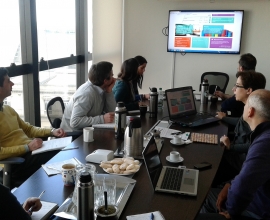EUROsociAL supports the Office of Planning and Budgeting of Uruguay in strengthening the Annual Agenda of Public Evaluations
This technical assistance forms part of a regional process for strengthening the national evaluation systems of 5 Latin American countries (Costa Rica, Ecuador, Paraguay, Peru and Uruguay)
Within the framework of the Planning-Budgeting Link line of action of EUROsociAL II, a programme funded by the European Union, between 22nd and 26th June 2015, a specialist advisory event took place in Montevideo, Uruguay, for the Management and Evaluation Division (AGEV) of the Office of Planning and Budgeting (OPP) of Uruguay, with the aim of strengthening the Annual Agenda of Public Evaluations.
The institutional mission of the AGEV is to advise Senior Officials of the Office of Planning and Budgeting and to interact with public bodies in order to promote a cross-cutting approach, the development capabilities and the adoption of the best management practices, by results, in matters relating to planning, budgeting, monitoring and evaluation of public policies.
Within this framework, the AGEV-OPP requested the support of EUROsociAL in strengthening the National Agenda of Evaluations and sharing international experiences and good public administration practices in relation to these matters. A technical assistance event was therefore put together by the Coordinator of the FIIAPP Evaluation Programme, Miguel Angel Lombardo, and expert Blanca Lázaro, who prepared a Comparative Study on the Institutionalisation of Evaluations in Europe and Latin America, which included a series of international experiences for the consolidation of evaluation systems.
As a part of the Technical Assistance event, experts held meetings with coordinators of the different citizen security programmes in Uruguay, run by the Ministry of Justice and the Minister of the Interior, respectively. The first of these meetings included the presentation of the Ankle Tag Programme, aimed at protecting victims of domestic and gender-based violence, and an analysis of the various different evaluation options which could be used to assess the effectiveness of the program in terms of victim protection and the eventual reduction of repeat offenders.
The second of these meetings included an analysis of the experiences of the Industrial Hub of Santiago Vázquez Unit 4, one of the country’s main prisons, where a programme has been launched for the inclusion and rehabilitation of persons deprived of their liberty. Accompanied by the Deputy Administrative Director of the National Institute for Rehabilitation, Jaime Saavedra, the group was able to assess the scope of the programme in situ. During the course of the visit and during the meeting held with the AGEV-OPP and the Ministry of the Interior in Montevideo, several evaluations were discussed, each aimed at assessing not only the effectiveness of the forecast outcomes of the Programme, but also its design and management model.
Finally, the group took part in a series of workshops organised by the AGEV-OPP on Management by Results as a working method that involves a process of continuous improvement in public sector management.
This activity is encompassed within the Planning-Budgeting Link line of action of the Public Finance area of EUROsociAL, a programme financed by the European Union and coordinated by FIIAPP.
FIIAPP

